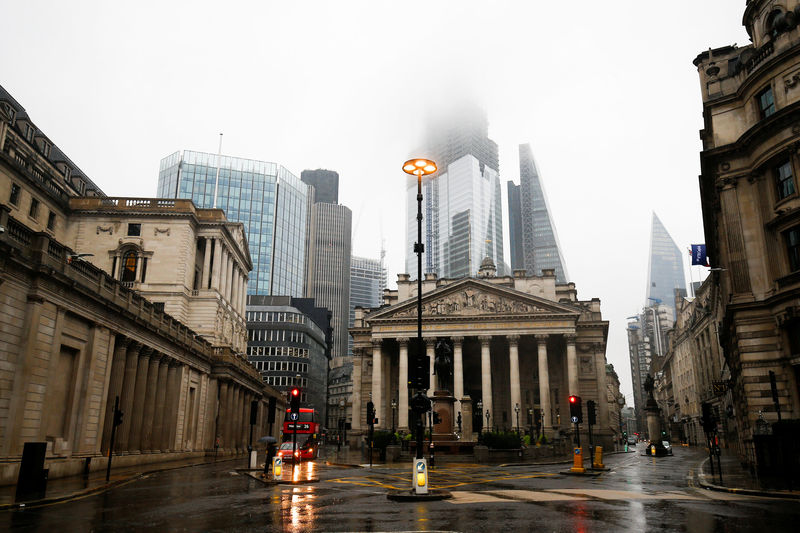(Bloomberg) -- Leading central banks made a big call this week, deciding that the coronavirus is no longer calling the shots in their economies, and inflation is now the bigger threat.
For almost two years, the main challenge for monetary authorities was to anticipate where the next pandemic blow might fall -- and cushion its impact on economic growth and employment.
Not any more. In the last couple of days, central banks in the U.S. and Europe have pivoted –- at varying speeds -- toward tighter policy. They now see reining in prices as a higher priority than protecting output and employment from further pandemic fallout.
The Bank of England on Thursday became the first central bank in a Group of Seven economy to raise interest rates since Covid-19 arrived. The Federal Reserve said Wednesday it will bring forward the end of its bond-buying program and signaled three rate hikes next year. The European Central Bank is also winding down emergency measures.
“It does not seem that the Fed or other central banks are feeling it necessary to ignore the very strong signals and elevated inflation readings they’ve seen just because of Covid,” says Mark Cabana, head of U.S. interest-rates strategy at Bank of America (NYSE:BAC). “In fact we’re seeing actions to the contrary.”
‘Better at Coping’
Behind the shift lies an assessment that, while Covid-19 isn’t going away, Western countries are figuring out how to live with it -- and the impact on economies of each virus mutation will be smaller than the previous one.
“Many people have been vaccinated, and booster campaigns have accelerated,” ECB President Christine Lagarde said on Thursday. “Society has become better at coping with the pandemic waves and resulting constraints. This has lessened the pandemic impact on the economy.”
What’s more, as central bankers have learned more about pandemic inflation, they’ve arrived at a different view of how new virus outbreaks impact the economy.
Early in the crisis, the focus was on lockdowns as a damper to consumer demand -- which easy monetary policy could help prop up. Now, officials also worry about the way health restrictions hold back the supply and transportation of goods -- driving up prices, and strengthening the case for higher interest rates.
“Previous economic frameworks were about what happens to demand growth,” says Sanjay Raja, an economist at Deutsche Bank (DE:DBKGn) in London. “Now it’s about the hit to demand versus the hit to supply. That is changing the calculus.”
Restrictions Are Back
That there are plenty of risks in this central-bank pivot is clear from the havoc the omicron variant of Covid-19 has been causing in the run-up to it.
Especially in Europe, governments are reimposing some of the restrictions -- from work-at-home guidance to travel curbs -- that they’d lifted earlier in the year, as cases spread rapidly and hospitals fill up once again. Criticized for being too comfortable about inflation in recent months, there’s a risk that officials are playing down the ongoing pandemic too much now.
Still, at press conferences this week, central bankers made it clear that they see Covid risks as diminishing -- while their tolerance of price pressures has run out.
On Wednesday, Chair Jerome Powell rejected a suggestion that the Fed should refrain from winding up its so-called taper by March because of the latest virus threat. “Omicron doesn’t really have much to do with that,” he said.
Powell acknowledged that there are plenty of unknowns surrounding the new variant. He pointed out that the last one to spread across the world hurt the supply side of economies as well as crimping demand.
“Delta had an effect of slowing down hiring,” Powell said, but also “hurt the process of the global supply chains getting worked out.”
What’s Transitory?
Those disruptions, coupled with strong consumer demand shored up by government spending to protect households in the pandemic, are what’s driven inflation to multi-year highs across Western economies.
Central bankers argued until recently that the price spike wouldn’t last long -- a stance they’re now walking away from.
They’re worried that supply-chain blockages and labor-market shifts triggered by Covid-19 may be around for a while – and if inflation gets entrenched, households and businesses may come to anticipate more of the same, and that expectation could prove self-fulfilling.
Effectively, the central banks are now betting that it’s the new virus waves -– or at least their economic impact -- that will turn out to be transitory.
©2021 Bloomberg L.P.
